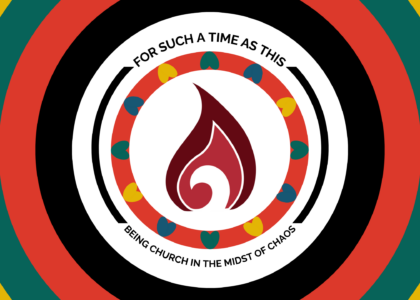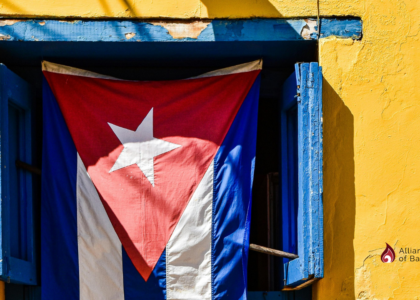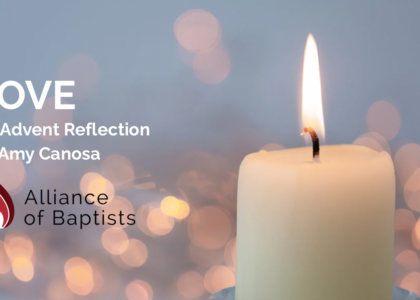By Laura Mayo
Waving palms to weeping passion. From shouts of “Hosanna” to cries of anguish; from “Blessed is he who comes in the name of the Lord” to “Crucify;” from spreading cloaks to spilling blood. Holy week. The last week.
Holy week begins with Jesus’ arrival in Jerusalem at the beginning of the week of Passover. Jerusalem was a place of tension. It was the center of religious devotion; the place of God’s presence in the temple. And yet it was also the center of religious collaboration with imperial power. Under Roman rule, not only were people to bring their tithes to the temple, but also they were to pay imperial taxes there.
On Sunday, Palm Sunday, Jesus enters Jerusalem riding on a donkey cheered by his followers. Jesus’ entry was in direct contrast to the Roman imperial procession of troops and cavalry which entered Jerusalem every year to prepare for the influx of people at Passover. Columns of soldiers and horses, armor and weapons appear in sharp contrast to a single man on a colt, peasants’ cloaks and palm branches. Jesus’ parade proclaimed his devotion to a realm of peace and a God of justice rather than a kingdom of might.
From this public demonstration of the contrast between Jesus’ kingdom of peace and the Roman Kingdom of oppression, Jesus’ passion for the realm of God bleeds into Monday and Tuesday. On each of these days Jesus confronts the political and religious authorities. On Monday, he holds his demonstration in the courtyard of the temple. The home of God had become a den of robbers, co-opted by Rome for taxation, the center of religious enmeshment with imperial power. On Tuesday Jesus goes right back to the temple. This time we are given a guide to non-violent engagement; an example of what it might mean to love our enemies. Jesus’ detractors try to trap him. They ask him about taxes: should they pay them or not? Jesus responds: “Render unto Caesar what is Caesar’s, and unto God what is God’s.” If the coin belongs to Caesar, let him have it. The rules are Caesar’s, the violence, the oppression, but how we respond – that’s God’s, and Caesar has no power over that. Jesus’ teaching on nonviolence is integral to his proclamation of the dawning of the reign of God. Jesus shows us how to resist the oppressors without being made over into their likeness.
On Wednesday Jesus stays in Bethany. No trips into Jerusalem. No shouting, no table flipping, no challenging the authorities. He must be tired. He sits down at the table at the home of a leper where he is staying and a woman comes to him with expensive ointment in an alabaster jar. She breaks the jar open and the leper’s house which had smelt of rotting flesh; the leper’s house begins to smell sweet and fragrant. The sweet smell intensifies as she pours the ointment on Jesus’ head, massaging it into his hair.
It doesn’t take long for the perfumed smell to make its way to the other disciples who come to investigate. They find Jesus sitting at the table with the woman pouring ointment on his hair. The sight, the smell, the small space; it is all too much! They’ve been following this man for months, some of them for years; they’ve spent many nights sleeping outside; they’ve found shelter with lepers, tax collectors, and other outcasts; they’ve been hungry while sharing their bread with those whose bellies were even more empty.
And now this! The disciples ask: “Why was the ointment wasted in this way? For this ointment could have been sold for more than three hundred denarii, and the money given to the poor.” Or to us, for that matter! We could have a decent meal, maybe sleep in a bed where we don’t smell rotting flesh with each breath! That ointment is a year’s worth of wages. We walked away from wages, from our boats and our tax booths to follow you. We thought we were changing the world, not getting ourselves killed. And for what? What are you doing letting this woman waste so much money on you!??!
Jesus responds: “Let her alone; why do you trouble her? She has performed a good service for me. She has done what she could; she has anointed my body beforehand for its burial. Truly I tell you, wherever the good news is proclaimed in the whole world, what she has done will be told in remembrance of her.” This woman, of all those who have been following Jesus, she alone understood what Jesus has been trying to tell them. Each time Jesus prophesied about his own death and resurrection, she heard, she believed, she drew the obvious conclusion. Since you are going to die, I must anoint you now beforehand, because I will never have a chance to do it afterward. She embodied the lavish generosity of the realm of God.
Jesus, in his last week, continues to give us alternatives: two parades: the empire’s parade of military might or the peasant parade of peace; two ways of dealing with conflict: effort after effort to entrap or non-violent active love as resistance; two ways to be a disciple: the woman and her lavish outpouring of love or Judas and his bitter betrayal.
As Wednesday ends, the plot for Jesus’ arrest and execution is set in motion. But before Judas’ kiss, Jesus, in the way of people who seem to know their death is near, calls his beloved to him, one last meal, one last conversation. Jesus shares bread and wine and words. Jesus pleads with the disciples: Remember me. Remember me. My time is coming to an end. I need to know that as often as you eat this bread and drink this cup, that I will be with you and your memory, that my passion and my love will not be forgotten; that you will carry on the work of building the kingdom of God here on earth.
And from these tender moments as death approaches, we move swiftly into the anguish of the garden of Gethsemane – to the disciples who cannot stay awake to pray with Jesus as he begs that if there is another way that the cup might pass from him. And into this garden scene of sleeping disciples and anguished Jesus enters Judas with the authorities – Jesus is betrayed, arrested, beaten, mocked. The crowds trade their shouts of “Hosanna” for “Give us Barabbas” and then “Crucify!” Jesus is executed on a cross – an imperial cross, reserved for those who defied imperial authority. Jesus was killed – he didn’t just die, but was executed by the powers that ruled his world. He sacrificed his life for his passion, his passion for the realm of God’s love.
In Luke’s Gospel, after the exhilarating ride of early Sunday but before the anger of Monday, Jesus wept over Jerusalem, saying, “If you, even you, had only recognized on this day the things that make for peace!” This lament seems to color every moment of Jesus’ last week. If only you had known the things that make for peace: if only you had seen the way of nonviolent resistance, the way of lavish love, the way of remembering.
We are moving through holy week once again, in our time and in our place. The same choices are before us. Can we see the things that make for peace? Can we choose, like the woman following Jesus to do the things we can do for lavish love?

Rev. Laura Mayo is the Senior Minister of congregational partner Covenant Church in Houston, Texas. She is a graduate of Carson-Newman College in Jefferson City, Tennessee and Wake Forest University Divinity School in Winston-Salem, North Carolina. Laura is active in Houston interfaith work and is regularly published in the Houston Chronicle and Baptist News Global. Laura has served on the board of the Alliance of Baptists.





Recent Comments